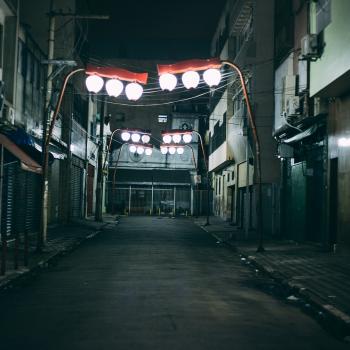A now viral Facebook post by Southern California mom, Diandra Toyos, reports that she and her children were stalked by probable human traffickers while shopping in IKEA. The post has now been shared over 100,000 times on Facebook. I saw it float through my newsfeed by multiple people, and had many readers email me directly to ask my opinion.
Human trafficking is a hot topic and one that I’ve written about extensively, in addition to having four years doctoral work in this field– studying trafficking in both the US and India. Beyond being a hot topic, it is also widely misunderstood with claims and “facts” about human trafficking rarely, if ever, questioned.
In her FB post, Toyos describes being at IKEA and being followed by well-dressed men who didn’t appear to be together. She says they pretended to shop but that it seemed obvious they were interested in her small children. Some of them walked in circular patterns, some reportedly stood near the exits, but the key interest she noticed was in her small children. She writes:
“They were dressed nicely but very differently. I would never have put these two together. And they didn’t appear to be together.
The area they were hanging around had an exit right by it. IKEA is a massive confusing maze of a store. But they could have run out that exit with my child and handed them off to someone waiting outside and been gone before I could find them.
Something was off. We knew it in our gut. I am almost sure that we were the targets of human trafficking. This is happening all over. Including the United States. It’s in our backyards. I’m reading more and more about these experiences and it’s terrifying. If not that, something else shady was obviously going on. Either way, as parents, we NEED to be aware.
Please PLEASE be aware when you’re out with your children. It’s not the time to be texting or facebooking or chatting on the phone. When you’re in a public place with your kids, please be aware and present so that you don’t become a victim. Had I not been paying attention that day… or had I let my kids roam and play while I checked my phone… I may have lost one. The thought just makes me completely ill.”
First, I’m writing this because as someone who has studied trafficking for so many years, I’ve been asked my opinion on it. However, I want to be clear that in my answer, I’m not attempting to disparage Toyos. I don’t know her and don’t have any reason to believe she’s making this story up– it certainly sounds like she had an experience that she legitimately perceived as threatening to her children. If I were a parent of small children and were being followed in a store by several people who seemed to be starring at my kids, I’d be freaked out too.
Ultimately, there’s no way to know what happened in this case. Was she being followed by some people with evil intentions? Maybe. Was she misreading a situation? That’s possible. Could it have been under cover law enforcement working a situation that had nothing to do with her? The reality is that this situation could have been something bad, or a complete misunderstanding– we’ll never know for sure.
But here’s what I do know: None of this follows any pattern of human trafficking that I have ever heard of, and I rate it “highly unlikely” that her kids were almost victims of human trafficking.
Let me briefly lay out why:
Human trafficking is an issue of forced labor. It is when an individual is forced or coerced to do a job they do not want to do.
Toddlers are not high on the desirability list for a human trafficker– it’s just not how this works. I mean, have you ever tried to get a two-year-old to cooperate? This isn’t exactly a financially lucrative endeavor.
If you were talking about a teenage runaway who was fleeing a broken foster care system and was vulnerable to coercion and desperate for money, that’s one thing. If you were talking about someone who came to the US to work in a restaurant, who lived in the basement and had their passport taken from them, and speaks no English, that would be another. I can think of a host of scenarios that place one in a position of being more vulnerable to trafficking– but being a toddler at IKEA with two adults shopping with you, isn’t one of them.
And while Toyos in her post says, “this is happening all over” the reality is that it’s not. Yes, human trafficking is an issue and that happens all over, but little kids are not being plucked out of stores or off playgrounds by human traffickers (and if your idea of human trafficking is someone being grabbed off the street and thrown into an unmarked van, you’ve seen too many movies). In fact, the actual statistics show that it’s on average around 100 children a year who are kidnaped by strangers— and I’ve seen no evidence that any serious percentage (or any at all) of those approx 100 cases, have anything to do with actual human trafficking (forced labor).
Thus, one can safely say that young children being kidnaped by human traffickers is so exceedingly rare, it ought be a non-concern.
My end-take? It sounds like she had a spooky situation at IKEA. While I ultimately don’t know the intentions of all parties in that scenario, I feel quite confident in saying that the idea she was being stalked by human traffickers is highly unlikely at best.
 Dr. Benjamin L. Corey is a public theologian and cultural anthropologist who is a two-time graduate of Gordon-Conwell Theological Seminary with graduate degrees in the fields of Theology and International Culture, and holds a doctorate in Intercultural Studies from Fuller Theological Seminary. He is also the author of the new book, Unafraid: Moving Beyond Fear-Based Faith, which is available wherever good books are sold. www.Unafraid-book.com.
Dr. Benjamin L. Corey is a public theologian and cultural anthropologist who is a two-time graduate of Gordon-Conwell Theological Seminary with graduate degrees in the fields of Theology and International Culture, and holds a doctorate in Intercultural Studies from Fuller Theological Seminary. He is also the author of the new book, Unafraid: Moving Beyond Fear-Based Faith, which is available wherever good books are sold. www.Unafraid-book.com.
Keep up to date with BLC! Visit his NEW site, and be sure to subscribe to subscribe to his new posts and updates, right here:
You can also follow BLC on Facebook:













